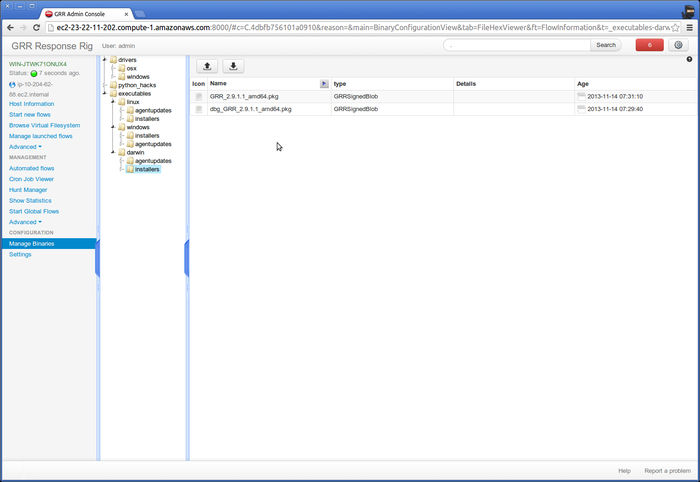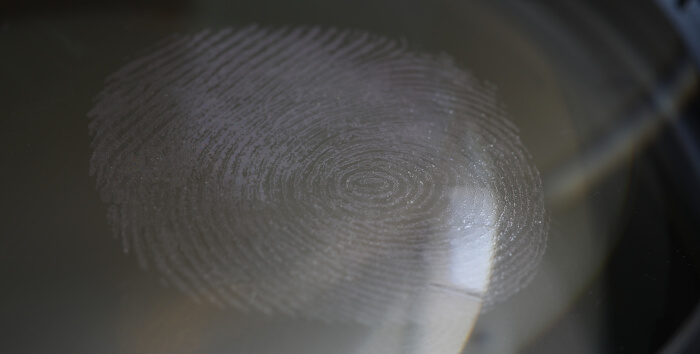GRR Rapid Response is an incident response framework focused on remote live forensics.
The goal of GRR is to support forensics and investigations in a fast, scalable manner to allow analysts to quickly triage attacks and perform analysis remotely.
GRR consists of 2 parts: client and server.
GRR client is deployed on systems that one might want to investigate. On every such system, once deployed, GRR client periodically polls GRR frontend servers for work. “Work” means running a specific action: downloading file, listing a directory, etc.
GRR server infrastructure consists of several components (frontends, workers, UI servers) and provides web-based graphical user interface and an API endpoint that allows analysts to schedule actions on clients and view and process collected data.
Features include:
- Client:
- Live remote memory analysis using YARA library.
- Powerful search and download capabilities for files and the Windows registry.
- OS-level and raw file system access, using the SleuthKit (TSK).
- Secure communication infrastructure designed for Internet deployment.
- Detailed monitoring of client CPU, memory, IO usage and self-imposed limits.
- Cross-platform support for Linux, OS X and Windows clients.
- Server:
- Fully fledged response capabilities handling most incident response and forensics tasks.
- Enterprise hunting (searching across a fleet of machines) support.
- Fast and simple collection of hundreds of digital forensic artifacts.
- AngularJS Web UI and RESTful JSON API with client libraries in Python, PowerShell and Go.
- Powerful data export features supporting variety of formats and output plugins.
- Fully scalable back-end capable of handling large deployments.
- Automated scheduling for recurring tasks.
- Asynchronous design allowing future task scheduling for clients, designed to work with a large fleet of laptops.
Website: github.com/google/grr
Support: Mailing List
Developer: Mikhail Bushkov, Ben Galehouse, Łukasz Hanuszczak, Andreas Moser, Denver Ogaro, Max Vogler
License: Apache License 2.0

GRR is written in Python. Learn Python with our recommended free books and free tutorials.
Return to Digital Forensics | Return to Incident Response
| Popular series | |
|---|---|
| The largest compilation of the best free and open source software in the universe. Each article is supplied with a legendary ratings chart helping you to make informed decisions. | |
| Hundreds of in-depth reviews offering our unbiased and expert opinion on software. We offer helpful and impartial information. | |
| The Big List of Active Linux Distros is a large compilation of actively developed Linux distributions. | |
| Replace proprietary software with open source alternatives: Google, Microsoft, Apple, Adobe, IBM, Autodesk, Oracle, Atlassian, Corel, Cisco, Intuit, SAS, Progress, Salesforce, and Citrix | |
| Awesome Free Linux Games Tools showcases a series of tools that making gaming on Linux a more pleasurable experience. This is a new series. | |
| Machine Learning explores practical applications of machine learning and deep learning from a Linux perspective. We've written reviews of more than 40 self-hosted apps. All are free and open source. | |
| New to Linux? Read our Linux for Starters series. We start right at the basics and teach you everything you need to know to get started with Linux. | |
| Alternatives to popular CLI tools showcases essential tools that are modern replacements for core Linux utilities. | |
| Essential Linux system tools focuses on small, indispensable utilities, useful for system administrators as well as regular users. | |
| Linux utilities to maximise your productivity. Small, indispensable tools, useful for anyone running a Linux machine. | |
| Surveys popular streaming services from a Linux perspective: Amazon Music Unlimited, Myuzi, Spotify, Deezer, Tidal. | |
| Saving Money with Linux looks at how you can reduce your energy bills running Linux. | |
| Home computers became commonplace in the 1980s. Emulate home computers including the Commodore 64, Amiga, Atari ST, ZX81, Amstrad CPC, and ZX Spectrum. | |
| Now and Then examines how promising open source software fared over the years. It can be a bumpy ride. | |
| Linux at Home looks at a range of home activities where Linux can play its part, making the most of our time at home, keeping active and engaged. | |
| Linux Candy reveals the lighter side of Linux. Have some fun and escape from the daily drudgery. | |
| Getting Started with Docker helps you master Docker, a set of platform as a service products that delivers software in packages called containers. | |
| Best Free Android Apps. We showcase free Android apps that are definitely worth downloading. There's a strict eligibility criteria for inclusion in this series. | |
| These best free books accelerate your learning of every programming language. Learn a new language today! | |
| These free tutorials offer the perfect tonic to our free programming books series. | |
| Linux Around The World showcases usergroups that are relevant to Linux enthusiasts. Great ways to meet up with fellow enthusiasts. | |
| Stars and Stripes is an occasional series looking at the impact of Linux in the USA. | |
